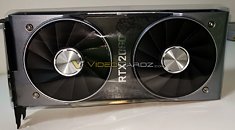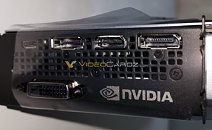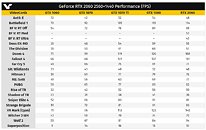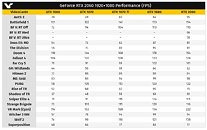Sunday, December 30th 2018

NVIDIA GeForce RTX 2060 Founders Edition Pictured, Tested
Here are some of the first pictures of NVIDIA's upcoming GeForce RTX 2060 Founders Edition graphics card. You'll know from our older report that there could be as many as six variants of the RTX 2060 based on memory size and type. The Founders Edition is based on the top-spec one with 6 GB of GDDR6 memory. The card looks similar in design to the RTX 2070 Founders Edition, which is probably because NVIDIA is reusing the reference-design PCB and cooling solution, minus two of the eight memory chips. The card continues to pull power from a single 8-pin PCIe power connector.
According to VideoCardz, NVIDIA could launch the RTX 2060 on the 15th of January, 2019. It could get an earlier unveiling by CEO Jen-Hsun Huang at NVIDIA's CES 2019 event, slated for January 7th. The top-spec RTX 2060 trim is based on the TU106-300 ASIC, configured with 1,920 CUDA cores, 120 TMUs, 48 ROPs, 240 tensor cores, and 30 RT cores. With an estimated FP32 compute performance of 6.5 TFLOP/s, the card is expected to perform on par with the GTX 1070 Ti from the previous generation in workloads that lack DXR. VideoCardz also posted performance numbers obtained from NVIDIA's Reviewer's Guide, that point to the same possibility.In its Reviewer's Guide document, NVIDIA tested the RTX 2060 Founders Edition on a machine powered by a Core i9-7900X processor and 16 GB of memory. The card was tested at 1920 x 1080 and 2560 x 1440, its target consumer segment. Performance numbers obtained at both resolutions point to the card performing within ±5% of the GTX 1070 Ti (and possibly the RX Vega 56 from the AMD camp). The guide also mentions an SEP pricing of the RTX 2060 6 GB at USD $349.99.
Source:
VideoCardz
According to VideoCardz, NVIDIA could launch the RTX 2060 on the 15th of January, 2019. It could get an earlier unveiling by CEO Jen-Hsun Huang at NVIDIA's CES 2019 event, slated for January 7th. The top-spec RTX 2060 trim is based on the TU106-300 ASIC, configured with 1,920 CUDA cores, 120 TMUs, 48 ROPs, 240 tensor cores, and 30 RT cores. With an estimated FP32 compute performance of 6.5 TFLOP/s, the card is expected to perform on par with the GTX 1070 Ti from the previous generation in workloads that lack DXR. VideoCardz also posted performance numbers obtained from NVIDIA's Reviewer's Guide, that point to the same possibility.In its Reviewer's Guide document, NVIDIA tested the RTX 2060 Founders Edition on a machine powered by a Core i9-7900X processor and 16 GB of memory. The card was tested at 1920 x 1080 and 2560 x 1440, its target consumer segment. Performance numbers obtained at both resolutions point to the card performing within ±5% of the GTX 1070 Ti (and possibly the RX Vega 56 from the AMD camp). The guide also mentions an SEP pricing of the RTX 2060 6 GB at USD $349.99.





234 Comments on NVIDIA GeForce RTX 2060 Founders Edition Pictured, Tested
'Initial sales boom and stagnant'
Did other cards show the same so is it really different? Is it not a normal thing to see a lot of sales out of the gate and it settles? I mean... what's the point here??? I struggling to take much away from it for many reasons.
Premature conclusion without context is premature bud. Sorry. We have no idea if this is not normal with the data there. I find a trend of initial sales and then it slowing down to be part of a normal sales life cycle of a new product...only time will tell if this is a 'trend'...the data doesnt.
We'll have to agree to disagree.:)
Sentiment. For Turing it has been as abysmal as DXR performance at BFV launch. That same sentiment is reflected in Nvidia stock value and on this forum at large, and on the big bad interwebs too. People ain't stupid, only a small percentage of them is.
This is the paradox of the crystal ball ey. When you predict it, there is no data, and when you confirm it afterwards, people say it was 20/20 hindsight. So far with regards to Turing my ball was pretty accurate from the moment somebody shouted 10 Gigarays on stage.
That said, I believe it to be a bit slower due to price, and the overblown dead card issue, but I'm built off facts and these graphs dont give me (anyone) enough information to factually make that jump. I'd like to see 9xx to 10xx series rates and 7xx to 9xx series as well as that chart in 2 years to see how adaptation REALLY shakes out. It's simply a premature conclusion (but with writing on the wall).
As for stock being low... yeah it's selling out, but that doesn't mean that NVIDIA is delivering a lot of GPUs to AIBs or owners. By this time in it's product cycle, Pascal was easy to get. Not many RTX cards are truly that easy to get.
Why? Nvidia is possibly having some issues with yields, we've already seen several reports of things not being smooth as you'd want them to be. None of this is surprising, but it is telling when it comes to how feasible Turing is in the long run. We know these dies are flippin' massive. We know that inflates the price, and we see it happening right in front of our eyes. This launch was rushed to be in time for Christmas, and missed the mark.
OR: Nvidia is holding on to their purchased production capacity for other product lines... GTX 1060 versions out of GP104 perhaps? Or the myriad of 2060's we're about to see? A rumored GTX 11xx series?
Either way, you don't do any of this when you've got a sweet, viable product that people are waiting in line for.
Have fun guys!
EDIT: Also, plenty of stock here in the states (newegg/amazon/brick and mortar stores like BBuy and MCenter).
What woulds they have gained by waiting? More stock when there is currently stock (at least for the US and UK). I mean some models are not available, but is this because of how the card partner cut it or NVIDIA? How does anyone know allocations to card partners? Why can't those not in stock be an issue on the AIB providing the different than ref/FE boards? There can be plenty of reasons some models don't show. ;)
Unless AMD pulls something off their hat in January, $350 to $400 for the RTX 2060 will be in tune with what AMD also offers! Nvidia with their dominant position, is not interested in disrupting the market with price/performance.
We are in the same situation as before Ryzen on the GPU market, with the difference that Nvidia can design something new like almost/fake RTRT, it's mostly useless for now, but it's new anyway.
We need competition, that being the Nth iteration of GCN, or whatever Intel is doing.
RTX fans sound just like "hurr durr Vega is not GCN" fans.
The sense of injustice is absolutely wonderful. I'm not a fan of wealth or capitalism but I understand it. What I cannot comprehend is the attitude of people that complain so vehemently about pricing. Take a look around. Every successful company is doing it.
"They all do it" is not an argument, it's complacency.
Once they see their sales plummet as they see their shares now, we'll see what happens.
Coplaining about stupid prices is not a "sense of injustice", it's an option we have. What are companies now, dictatorship states? "Just buy it at whatever price they ask".